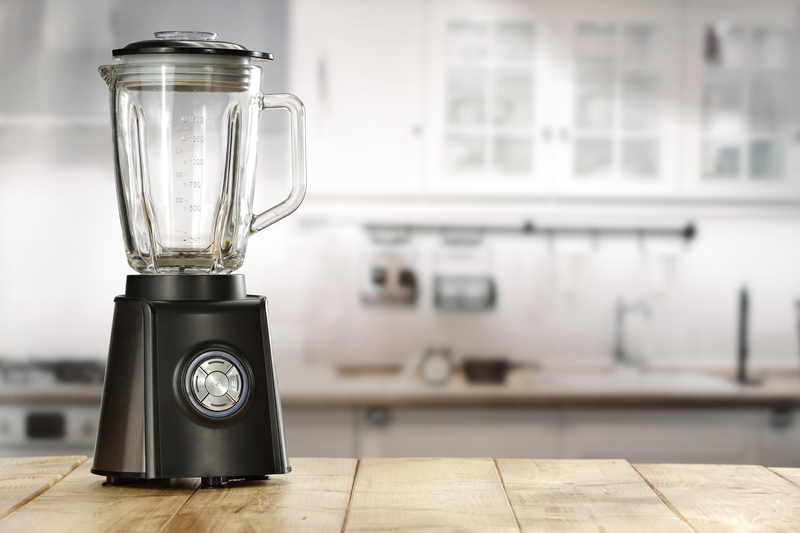Eliminate Pet Odors for a Fresher Home
Posted on 21/09/2025
Eliminate Pet Odors for a Fresher Home: The Ultimate Guide
Our pets bring joy, love, and comfort to our homes. However, for many pet owners, unpleasant pet odors can also become an unwelcome side effect. If you're struggling to maintain a fresh environment while sharing your house with cats, dogs, or other animals, you're not alone. In this comprehensive guide, we'll explore actionable strategies to eliminate pet odors and keep your home smelling clean--with tips that go beyond masking scents and help you achieve lasting freshness.

Understanding the Sources of Pet Odors
Before you can eliminate pet odors, it's crucial to understand where they come from. Most pet odors stem from:
- Pet fur and dander: Shedding, oils, and skin cells can accumulate on carpets, furniture, and clothing.
- Accidents and urine stains: Even well-trained pets can sometimes have accidents that seep into floors and fabrics.
- Litter boxes or cages: Improperly cleaned litter boxes, cages, or bedding can emit powerful odors.
- Saliva and drool: Dogs and some pets may drool, leaving saliva on upholstery and hard surfaces that eventually creates smells.
- Wet pet smell: Bathing or rainy days can cause dogs, especially, to develop a "wet dog" scent that lingers in the air and fibers of your home.
- Pet food: Pet food and treats, if left out or spilled, can attract bacteria and generate odors of their own.
Knowing these sources will help you target your cleaning efforts for maximum results.
Immediate Steps to Eliminate Pet Odors
Treat Accidents Promptly
If you discover a pet accident, act fast! The longer urine or vomit sits, the deeper it can soak into carpets and upholstery--and the harder it is to remove the smell. Here's what to do:
- Blot (don't rub) the area with paper towels or an absorbent cloth. Soak up as much liquid as possible.
- Apply a pet-safe enzymatic cleaner, which breaks down the organic molecules causing odors. Enzyme-based cleaners are specifically designed to eliminate urine and biological stains.
- Rinse and blot again, repeating if necessary, until the spot is odor-free.
Increase Ventilation
Open windows and use fans regularly. Fresh air helps dilute indoor odors and keeps the environment from becoming stale. On sunny days, *let in natural light*--it not only boosts mood, but also helps keep your home fresh.
Deep Cleaning: The Key to Odor Elimination
Regular Vacuuming and Washing
Routine cleaning is essential if you want to eliminate dog odors or cat smells. Here's how to stay ahead:
- Vacuum carpets, rugs, upholstery, and pet beds at least once a week. Use a vacuum cleaner equipped with a HEPA filter to trap fine particles like pet dander.
- Empty the vacuum canister or change bags frequently to avoid redistributing smells.
- Wash pet bedding, blankets, and washable toys in hot water weekly.
- For surfaces your pet frequents, such as couches or beds, use a fabric refresher or sprinkle baking soda before vacuuming to help absorb persistent smells.
Deodorize Floors and Furniture
For hard floors and tile, mop using a solution of one part white vinegar to two parts water. Vinegar is a powerful natural deodorizer that neutralizes many household odors.
For upholstered furniture and carpets:
- Sprinkle baking soda generously onto the surface. Let sit for at least 15-30 minutes (even overnight for tough odors).
- Vacuum thoroughly. If needed, repeat the process.
- The combination of baking soda and vacuuming helps capture and eliminate lingering pet odors at the source.
Steam Clean Periodically
Steam cleaning carpets and upholstery is one of the most effective ways to eradicate deep-seated pet odors, especially after a major accident or for seasonal maintenance. Rent or invest in a pet-friendly steam cleaner for best results. Always follow manufacturer instructions and allow the items to dry completely before letting pets use them again.
Specialized Solutions for Persistent Pet Odors
Enzyme Cleaners: A Pet Owner's Best Friend
Enzyme-based cleaners are specifically formulated for pet odor removal. They contain natural enzymes and bacteria that feed on the organic matter left by urine, vomit, or feces, breaking it down until no odor-causing residue remains.
- Always read the label and use products designed for the type of surface you are cleaning.
- Enzymatic sprays are especially effective on carpets and fabrics but can be used safely on hard surfaces as well.
Activated Charcoal and Odor Absorbers
Charcoal-based air purifiers, gels, and bags are effective for capturing airborne pet smells and keeping small spaces like litter closets or dog kennels fresher. Place them in corners, closets, or near litter boxes to maintain a fresher indoor environment.
Odor-Blocking Paint and Sealants
For homes with severe, long-standing pet odor issues--such as rental houses previously occupied by multiple pets--it might be necessary to seal or repaint walls and floors using odor-blocking primers and paints. These products are specially formulated to lock in odors and prevent them from leaching back into the air.
Litter Box Management
Cat owners know that litter boxes are a prime source of household odors. Proactive management reduces smells drastically:
- Scoop waste – at least once or twice daily.
- Completely change litter weekly and scrub the box with soap and water.
- Consider using clumping, odor-control, or natural litters such as pine or crystal based, which reduce ammonia and trap smells efficiently.
- Place an air purifier or baking soda container near the box for continuous freshness.
Home Fragrance and Air Purification
Safe Scent Solutions
Avoid simply masking odors with heavy perfumes or chemical sprays, which can irritate sensitive pet noses (or your own). Instead, opt for:
- Essential oil diffusers (make sure oils used are safe for pets; avoid harmful oils such as tea tree, eucalyptus, and citrus for cats).
- Simmering natural ingredients like lemon slices, cinnamon, or cloves in water on the stove for a gentle, fresh scent.
- Opening windows regularly and using exhaust fans, especially when cleaning or after accidents.
HEPA Air Purifiers
A HEPA air purifier is an investment that pays off when it comes to keeping pet dander, allergens, and lingering odors out of your living areas. Place purifiers in the rooms your pets frequent most for maximum effect. Some models come with built-in carbon filters to trap and neutralize odors as well as airborne particles.
Preventing Pet Odors Before They Start
Regular pet grooming and hygiene is a critical aspect of prevention:
- Bathe dogs (and cats, if agreeable) according to their breed's needs--usually once a month. Use a mild, pet-safe shampoo, and dry thoroughly to avoid damp fur odors.
- Brush pets weekly to remove loose fur and dander that could be shed into your home.
- Wipe muddy paws before your pet enters the house to prevent dirt and moisture from reaching floors and carpets.
- Maintain dental hygiene--bad breath in pets can become a source of house odor if untreated.
Cleaning Pet Accessories
- Wash collars, leashes, and clothing regularly.
- Clean pet toys and bowls to prevent bacteria and saliva residue from becoming odor contributors.
Tips for a Pet-Friendly, Fresh-Smelling Home
- Create off-limit areas: Restrict pet access to certain rooms or furniture to limit where odors can accumulate.
- Use washable slipcovers: Furniture and bedding protected by machine-washable covers make cleaning simpler and more effective.
- Place doormats: At every entrance to catch dirt or debris that pets bring in from outside.
- Designate a "pet zone": Establish a specific area for eating, sleeping, and playing to concentrate pet hair and reduce overall cleaning requirements.
- Routine inspection: Check the less visible areas of your home--under furniture, along baseboards, and behind doors--for hidden pet messes that could be the source of mysterious odors.

Common Mistakes to Avoid When Dealing with Pet Odors
- Masking instead of treating: Spraying air fresheners only hides the problem; always clean the source of the odor.
- Delaying cleanup: Letting accidents or spills linger allows smells to set.
- Using harsh chemicals: Many cleaning products contain ingredients that can be toxic to pets. Always choose pet-safe cleaners.
- Neglecting vents and HVAC: Air ducts and filters can harbor pet odors--change filters regularly and consider professional duct cleaning if odors persist.
The Takeaway: How to Maintain a Fresh Home with Pets
Keeping a home free of pet odors requires a blend of regular cleaning, preventive care, and targeted treatments. By tackling the root causes and using tried-and-true methods--from enzyme cleaners to air purifiers--you can enjoy all the comfort and companionship your pets offer without sacrificing a clean, fresh home environment.
Consistency is key: Set a schedule for vacuuming, washing, and grooming, and stick to it. With a little time and effort, you'll find it's entirely possible to eliminate dog odors, cat smells, and any other pet-related odor issues, ensuring your living space remains welcoming for both your two-legged and four-legged family members.
For more tips on home cleaning and pet care, check out our related articles and expert guides. Your journey to a fresher, odor-free home starts today!
Latest Posts
Top-Rated Tools for Carpet Cleaning
Eliminate Pet Odors for a Fresher Home
Master the Art of Curtain Cleaning with Effective Techniques
Mastering the Art of Efficient Window Cleaning
Master the Art of End of Tenancy House Cleaning: Essential Tenant Guide



.png)